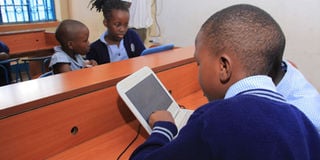Are our schools ready for tele-teaching?

Pupils learn on laptops at Victorious School in Kampala. Schools will soon start tele-teaching to boost performance of rural schools.
PHOTO BY Rachel Mabala
What you need to know:
While speaking to teachers in Kampala recently, Thembo Nyombi, the director Rural Communications Development Fund at the Uganda Communications Commission said government is set to introduce video conferencing in schools to enable rural learners to benefit from urban teachers, but are the school equipped for this yet?
In an attempt to connect rural to urban schools for better learning, government is set to start video conferencing lessons. According to Thembo Nyombi, the director Rural Communications Development Fund at the Uganda Communications Commission, the move is aimed at providing rural and urban students the same learning opportunities.
“We want to connect those big secondary schools such as Kisubi, Kings College Budo, Nabisunsa with rural schools to start teleconferencing this year so that they can share knowledge. We want a situation where a good Mathematics teacher in St Mary’s College, Kisubi is giving a lesson, and some 100 rural schools in Karamoja are be able to follow this lesson in Kisubi. That is the pilot we are doing,” he said recently.
Nyombi explains that with support from development partners, the government has spent about $20,000 (about Shs75m) on constructing the laboratories in 90 per cent of the schools.
According to Juliet Muzoora, the head teacher Bweranyangi Girls School, this initiative if well implemented will expose students to different learning opportunities which will help them learn comparatively. She adds that video conferencing will trigger students’ abilities to think which will be effective in their learning process.
“With video conferencing, students have to make enough research in order to be able to contribute effectively with the rest of the learners. This helps the learners to participate and also helps break the monotony of blackboard learning,” she says.
However, Emmanuel Kakuba, a teacher at Nyakasura School, says video conferencing may not be applicable in some rural schools. He points out that though ICT was introduced in secondary schools, it is still an optional subject for students.
He adds that some students in rural areas still have little knowledge about computers and may not favourably compete with other students in urban areas.
For a programme to work well, Kakuba also notes that all schools need to have moved at the same pace in covering the syllabus.
“Schools do not cover syllabi at the same pace, so how will you video conference students who are at different levels in terms of learning,” he wondered.
Similarly, Bright Niwamanya, a teacher at Bishops Secondary School Mukono, says the project also requires that teachers are well-trained in ICT as well. “It is not that all teachers are well versed in ICT, government needs to consider training teachers as well,” he says. He adds that if teachers are not trained, then there could be issues of structural unemployment.
But responding to this, Nyombi urged teachers to embrace trainings such that they are able to fit into the system.
“People have to train and retrain. We cannot miss ICT because we fear that people who do not have skills could lose their jobs. This is a reality. ICT has come to disrupt the way we do work. The teachers must make sure they fit into the eco-system,” he explained.
The objectives
According to Nyombi, the project is aimed at bridging the digital divide between rural and urban schools. He adds that is also meant to build teachers’ technical capacity, pedagogical capacity and know-how for integrating ICT in the curriculum but also monitor and evaluate the impact of the use of ICT in Education.
“This project will explore creative ways of ensuring sustainability of educational institutions’ ICT facilities and activities, develop local applications and ICT enhanced educational content and will also facilitate networking among educational institutions for information sharing and dissemination,” he says.
Is it time yet?
Kakuba observes that though video conferencing of lessons is a brilliant move, the number of computers at several schools is far small compared to the number of students and teachers. He says there is need to increase on the number of computers.
He also observes that a lot more sensitisation and training is needed for teachers to change their attitude and enhance their skills and competencies to use ICT in their respective subjects.
“Internet bills are also high, you cannot expect some rural schools to afford these bills consistently,” he notes. Like Nyombi said, “The only problem is paying for bandwidth. We do not know whether schools will be able to pay because UCC shall support them for one year.”
Voices
“Video conferencing is one of the best ways through which students can learn. First it tickles their ability to think first and secondly it introduces them to the world of ICT which we are currently in.”
Jude Luwaga, teacher, Seeta High School
“I pray that government provides all the necessary support to teachers so that they are able to implement the programme since currently, not so many teachers are well versed with ICT.”
Emmanuel Mugarura, head teacher, Kampala Smart Schools




